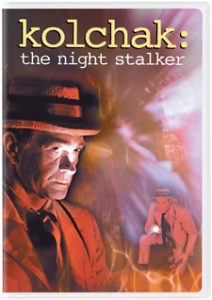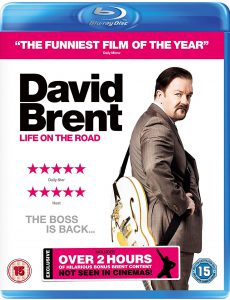Following up on BBC’s “The Office” – which aired back in “Two Thousand and cough-cough” (actually 2001-03) – Ricky Gervais finds there’s still plenty of room to pound the joke into the ground in “David Brent: Life on the Road” (released last year in the U.K., and now available on Netflix). Although there are some viewers who feel the punchline already landed in “The Office,” I enjoy a joke being stretched out till it becomes funny again, and that’s what happens in “Life on the Road,” which impressively adds more layers … well, to the one layer.
As fans of “The Office” know, David Brent (Gervais) desperately wants to be liked by everybody, but he utterly fails at every turn. To some degree, this is due to a lack of self-awareness, yet he’s paradoxically clearly aware of his lack of self-awareness. As the receptionist at his new workplace puts it, sometimes she “can see through his smiles” to the pain. A viewer’s mileage with “Life on the Road” will depend on how willing you are to look for the goodness inside Brent’s soul even as he provides mountains of evidence that you should give up.
Again seen through the lens of documentary footage, “Life on the Road” swaps out the Wernham Hogg paper sales company in Slough for new batches of colleagues. Although the supporting cast was a huge reason for “The Office’s” brilliance, I had no problem adjusting to the newcomers, including co-workers at bathroom supplier Lavichem, where David is one of many sales reps. Although Brent faces the expected antagonists in the form of his boss and the HR lady, he’s not totally on an island. Nigel (Tom Bennett) likes his jokes (and indeed, they are sort of a comedy duo); Pauline (Jo Hartley) likes our hero from a distance, which is obvious to the audience but not at all to David; and receptionist Karen (Mandeep Dhillon) also shows some sympathy to this poor, misguided man.
Most of the time is spent “on the road,” though, as Brent takes (mostly unpaid) time off from Lavichem to “tour” with his band, Foregone Conclusion. Although David rents a tour bus and books hotel rooms, every gig is at a local bar. Adding sadness and humor (and every moment in this film is equal parts sadness and humor) is the fact that this isn’t his band from back in the day, which itself probably didn’t rise above Battle of the Bands-level. Instead, he cashes out his retirement fund and racks up credit-card debt to hire musicians and crew. Inspired by the movie cliché, he lands sound man Dan (Tom Basden) by telling him whatever he’s making now, he’ll double it. In an aside, Brent uncomfortably notes his surprise at finding out how much Dan had been making.
Foregone Conclusion’s songs help the movie feel fresh, rather than merely a check-in with an old TV favorite. The band is musically competent, and would possibly even be great except for David’s lyrics, which are insightful and meaningful only in his mind. In reality, they are mundane or shockingly off-point. Not normal songs and not joke songs (like what you’d find in “Crazy Ex-Girlfriend”), they fall into the middle with beautiful awkwardness. Standouts include “Native American,” “Please Don’t Make Fun of the Disableds,” “Equality Street” and “Don’t Cry It’s Christmas.”

Getting a dose of Brent in movie form – rather than weekly episodes — changes the viewing experience a bit. I started off smiling at the classic Brent misfires and uncomfortable reactions. As “Life on the Road” goes on, and the band members and co-workers dutifully break down Brent’s flaws for the documentary crew, the melancholy “watching a car wreck” vibe rises to the surface. But then it infuses some welcome feel-good vibes. Although the band is in it for the money, and although aspiring rapper Dom (Ben Bailey Smith) is in it because he’s too nice to say no to David, those shared-journey feelings begin to turn rosier once it’s over. And maybe David will notice Pauline’s interest after all – and he won’t screw it up.
“Life on the Road” puts a nice bow on Gervais’ “Office” character. David Brent was a grand experiment in seeing how awful a person can behave on the outside while still having the viewer root for him because we know that persona is a misplaced affectation. Brent is “villain as hero,” but not like an HBO or FX series lead; instead, he is pathetically unsuccessful in all his selfish endeavors. (Adding to the apologetics: His transgressions are superficial and borne of ignorance; he never seriously hurts people.) While we wouldn’t go out of our way to be friends with this man, we can tell that all he needs is for someone to be a true friend. Brent forces us to look in the mirror and realize he’s just an extreme version of ourselves; he just wants to be liked.
As with “The Office,” we are never allowed to feel comfortable watching “Life on the Road,” but we know that to blame that on the film itself would be dishonest.

